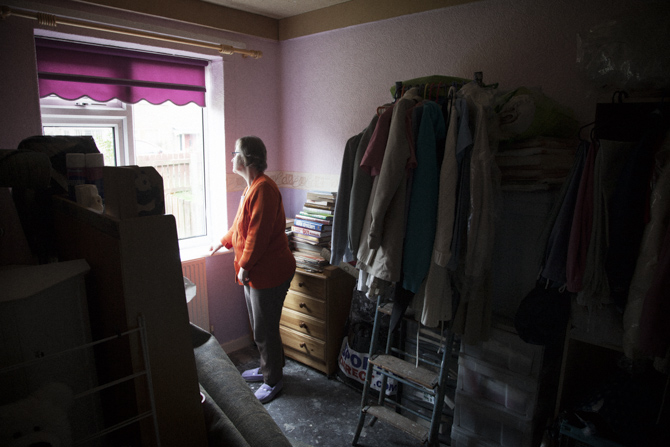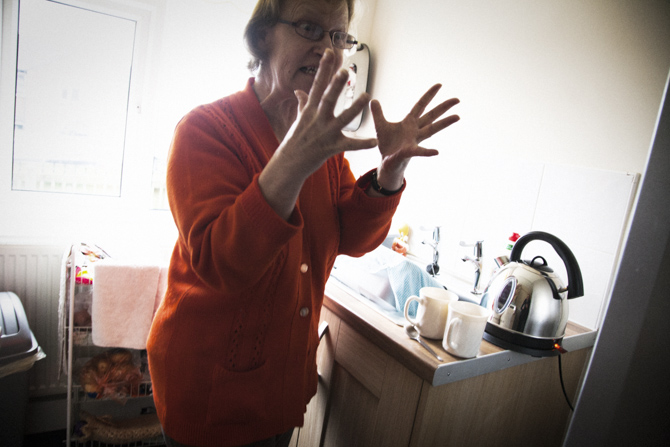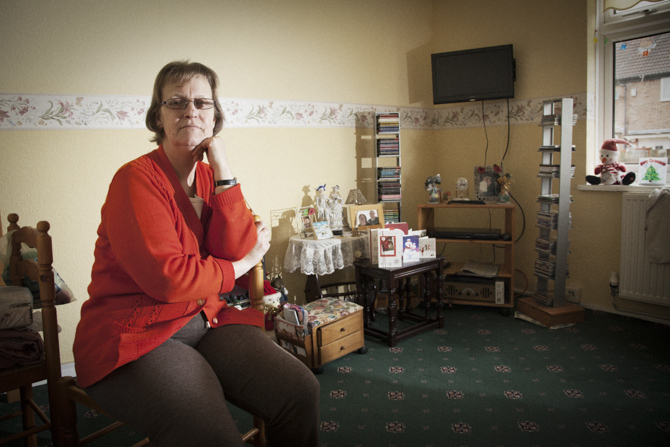Rob is telling me about the four clients he has seen this morning. Two of them have issues around the bedroom tax or, as he correctly calls it, the under occupancy surcharge.
“For this one client, it is particularly difficult,” he says. “He’s living alone in a three-bedroomed property and so his housing benefit has been reduced by 25%.”
“And what’s his income?” I ask.
“He’s on Employment Support Allowance,” says Rob, “which is just over £100 a week, so he’s potentially using a quarter of that for the rent.”
“Potentially?”
Turns out this customer is quite clued up. He’s already applied for, and been awarded, a Discretionary Housing Payment (DHP), an emergency pot given to each local authority to mitigate the effects of the bedroom tax, erm, under occupancy surcharge.
“But that’s temporary isn’t it?” I ask. “Designed as a stop gap.”
“It is. When it runs out he can make another application but there’s no guarantee he would be awarded a further payment.”

Before he became a full-time adviser four years ago, Rob was one of the Citizens Advice Bureau’s band of all-important volunteers. As well as money management, his 14 paid colleagues cover welfare benefits, housing, immigration and community care from their main office in Bolton town centre.
Every Monday morning he comes to this UCAN, sits in the small upstairs office and for two hours listens to the problems of Breightmet.
“This particular client,” Rob continues, “is downstairs on the computers pretty much every day. He’s making a lot of effort to find somewhere smaller so he can downsize.”
“But now he’s getting worried? It’s not his fault, is it?”
“No, it’s not and that’s the problem. With the under occupancy surcharge, we’re noticing that there are lots of people wanting one-bedroom properties but they’re just not available.”
“So,” I say, playing devil’s advocate, “let’s extrapolate. If this man has used all his DHP chances but still can’t find another place, then what?”
“He’s with a housing association – not Bolton at Home, I should say – and if he fell into arrears then they would have the right to take possession.”
“So he could be chucked out?”
“Hopefully it wouldn’t get to that, but yes, he could get evicted.”
“So, let’s just say he did, then what?”
“He’d make a homeless application to the council and, if he was deemed a priority because of his health, the local authority would have a duty to find him temporary accommodation – a hostel maybe – before they found him something permanent.”
“But that’s what he’s trying to do already. And all that costs money.”
“It’s unlikely to get to that. But it’s true, with pretty much everyone we see it’s not a case of them refusing to move, it’s a case of there not being any of the right sort of properties for them.”
For Breightmet customers it must be reassuring to get advice from someone who knows their way around welfare and housing bureaucracy, someone who will advocate on their behalf, write a letter, make a complaint. A bit like having an ally in often very unfamiliar territory.
“And Rob, how have things changed in the time you’ve been an adviser?”
“In the past I’d complete financial statements with clients and we’d find that their benefit would just about cover the basics: utilities, food, TV licence and a bit for travel.
“Now, with the cost of everything going up, financial statements are showing a deficit of £20 or £30 a week. Benefits are simply not sufficient to cover outgoings. So clients are having to make the decision about whether to put the heating on or buy food. It’s got to that.”
continued from… A double whammy
Faced with reduced housing benefit, tenants have a choice. Either they opt to adjust their budgets to take into account of the reduction or they move.
Neither option is straightforward. It’s highly unlikely that tenants have any slack in their limited budgets and so many decide to cut back on food or heating so they can stay in their homes. And moving isn’t always possible. Few housing providers have the optimum spread of property types to suit the demographics of all their customers.
I’ve heard Bolton at Home has a glut of perfectly good two-bedroomed flats in their tower blocks. Single people are unwilling to take them on because they’d incur the charge and, quite rightly, families aren’t keen because there’s nowhere for their kids to play.
This controversial charge has hit Lyn hard. It’s not applicable to pensioners and Lyn might have been able to stay in her ‘palace’ had it not been for the recent changes made to retirement ages. A progressive increase in the State Pension Age means that she can only ‘retire’ and start to draw State Pension when she is 63.

“What was your first reaction when you heard about the bedroom tax?” I ask.
Lyn purses her lips, deciding what to say next. “I was disgusted. I felt angry. I still feel angry. If I had been able to retire when I was 60 then I wouldn’t have had to move. But how could I afford to pay for two bedrooms for another three years?
“I saw this place was available back in February and the housing people told me it’d be ready in six weeks. So I started to pack. Within six weeks I was ready. But it was the end of October before I was able to move.”
“You mean it took seven months rather than six weeks?”
Since she moved five weeks ago Lyn and her friends have decorated the living room and, to save money, she’s brought her carpets from her old house and had them fitted here.
“It’s a lot warmer than the house,” she concedes.
“And is that it’s only saving grace?” I ask. “What do you miss about the old place?”
“Not being there!” she says indignantly. “We had a lot of laughs in that house. Up to the end my husband was always laughing and joking. That’s him there.” She points to a framed picture on a small table.
“And how did you feel on the day you left?” I ask. Lyn purses her lips again. It’s a unnecessary question. I already know the answer.
“Very upset. Very upset.”
Because she is claiming Jobseeker’s Allowance, Lyn has to show each week that she is searching for work or she risks sanctions. She’s been to sessions at the UCAN to learn basic IT so she can browse the Universal JobMatch website.
“Shop work, cashier, care assistant, anything really,” she says when I ask what she’s been searching for. “And I’ve had some interviews but you can tell from the way they look at you that they think you’re too old. Of course they can’t tell you that, but that’s what they’re thinking.”
“Do you think you’ll get a job between now and when you retire?”
“No, I’ve got no chance. I’d like to work but I’m not kidding myself. I think it’s degrading having to look for work at my age. I shouldn’t be doing it.”
No one has moved into Lyn’s old house and she takes the long way round when you goes to the UCAN so she doesn’t have to walk past it. “It still hurts,” she says.
I ask if I can take a picture in the bedroom, maybe of her sitting on the bed.
“That’s my bed,” she says, pointing to the settee I’m on. “The bedroom is packed with my old stuff. I haven’t got room to put the bed up yet, so I’m sleeping in here for now.”
I photograph Lyn in the bedroom anyway.
“I’ll keep it nice,” says Lyn. “But this will never be my palace.”

Before we’ve even sat down Lyn has started to tell me her story and can barely contain her rage.
Over the last couple of years she’s been hit by a double whammy of government policy changes that has seen her lose her house and, at age 60, forced her to continue looking for a job she thinks she’ll never, ever get.
Lyn and her husband Tom moved to Bolton nine years ago, at first near the town centre. “We had troublesome neighbours,” she recalls, “but were told we had to stick it out for a year before they would move us. Then we moved to Breightmet, near the UCAN.”
“And what was that house like?”
“We had three bedrooms, a front and back garden. Tom was a joiner and he fitted wardrobes in our bedroom; he revamped the kitchen, made it look much bigger than it actually was. He did lots on that house.
“In fact, Tom was my king and I was his queen and that, to me, was our palace. And this place,” she waves an arm, “this place will never be like that.”
Before Bolton the couple lived in France where Tom had a job inspecting campsites for a travel company. It was a good life. After nearly four years he was made redundant and within months of their return to the UK was diagnosed with cancer.
“Tom died three years ago. We’d met in 1998 and married in 2000 so we had just 13 years together. Before he died we had quite a good income. There was his pension and, because of his illness, he was on DLA [Disability Living Allowance].
“Now I’m on JSA [Jobseeker’s Allowance], £71 a week. It’s gone from this,” she extends her arms, “to this,” pinching a finger and thumb together. “And you think to yourself, how do you manage? But you do, you have to.”
“How much would you have had to pay in ‘bedroom tax’, if you’d stayed in that house?”
“I think it was £19 a week,” she says. “Out of £71.”

The under-occupancy penalty is a key element of the Government’s welfare reforms and is intended to reign in housing benefit payments. Why should the state pay for claimants to live in a bigger property than they need? Originally introduced into the private housing sector the penalty rolled out to include social housing from April 2013.
By way of balance I start to put the Government’s case for the ‘tax’ to Lyn, “Before you say any more,” she says, “I couldn’t give two hoots what the Government thinks because they are not living in the real world and don’t understand how we live. At the end of the day, it doesn’t matter who is in power and I’ll put it to you crudely,” – she does – “they’re all the same. They will never know what it’s like for us. Even if they left power tomorrow, they are so wealthy and affluent, they could just buy any house they wanted. We can’t.”
… continued in “This will never be my palace”
There’s lots going on in the front room this morning. Bags of soil and stacks of flower pots Vanessa and Carl are discussing whether the bulb planting activity they have planned for later should be out the back or on the pavement at the front. They agree they might attract more people if it’s at the front.
There’s a new member of staff in the kitchen given away by her Bolton at Home lanyard. I introduce myself to Hayley who, it turns out, is a debt advisor. I’ve only just written about Money Matters, the borough-wide debt advice service, and wonder why there’s another one. Seems places like Breightmet can’t get enough money advice.
We takes our mugs into one of the small offices upstairs and Hayley tells me their service, just 15 months old, was set up specifically to cope with the anticipated demand from their customers as the welfare reforms were rolled out. “Although we’re part of Bolton at Home, we’re impartial and we help our customers with all their debt issues.”
“So you’ve seen the direct effect of the cuts and the reforms? I suppose the bedroom tax is a big one?”
“Oh yes,” says Hayley. “People have had to make some serious decisions. Are they willing, or able, to downsize, or are they able to pay the extra from the money they have coming in? We can look at their expenditure on food and fuel to see if they can reduce that a little to free up some money to pay the under occupancy charge.”
“So your customers are having to spend less on food and fuel so they can afford the bedroom tax?”
“Yes, they are.”
“And in Bolton, is there enough housing stock of the right type to re-house customers?”
“That’s really not a question from me but realistically, no. If everybody who was under occupying, turned to us and said they were willing to move then no, we wouldn’t have enough of the right properties to move them to.”
“And then, on the other side of it, do you have an unmet demand from families who are waiting to take on those larger houses?”
“Again, I’m not the right person to answer that question but I suspect not. Ultimately this change is going to have the biggest impact on the customer, but also we as a housing organisation are affected because we’re going to have a lot of properties we’re unable to let.”

Thinking it must be soul-destroying listening to tales of unmanageable debt I ask Hayley what she gets out of it.
“For me, personally, I find debt advice very rewarding. As advisors – there are six on our team – we find a lot of customers don’t know the difference between priority and non-priority debt. They are making payments to non-priority debts well in excess of the amounts they should be paying.”
“I’m not sure either… what’s a priority debt?”
“One that has serious consequences if you don’t pay. So not paying the rent could lead to eviction, not paying council tax could lead to imprisonment. But the doorstep lender, who gets £20 each week because they come knocking on the door, can only threaten you with the bailiffs.
“The relief on people’s faces when you explain the difference and tell them you can work on their behalf to try and reduce or put on hold the non-priority debt, is very rewarding. We’ll write to the doorstep lender, explain the customer’s position, and that can really reduce the stress they are under.”
to be continued…





